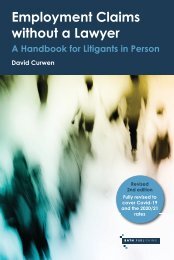Breaking Law: Services Charges and how cut them
A sample chapter from The Return of Breaking Law. Stephen Gold tells you how to tackle a landlord charging excessive service charges
A sample chapter from The Return of Breaking Law. Stephen Gold tells you how to tackle a landlord charging excessive service charges
Create successful ePaper yourself
Turn your PDF publications into a flip-book with our unique Google optimized e-Paper software.
Stephen Gold<br />
2nd edition<br />
the return of<br />
breaking<br />
Includes the<br />
new no fault<br />
divorce laws<br />
law<br />
[ ]<br />
A Judge’s Guide to Your<br />
Legal Rights & Winning<br />
in Court or Losing Well<br />
Free updates included at breakinglaw.co.uk<br />
Back bigger, better <strong>and</strong> bang up to date<br />
77 chapters covering almost everything: from service<br />
charges to drink-drive <strong>and</strong> from wills to parking tickets
Chapter 50<br />
Residential Service <strong>Charges</strong><br />
Cutting ’em down<br />
Paying service charges is as satisfying as self-extracting a molar during a<br />
p<strong>and</strong>emic. Paying <strong>them</strong> when they are excessive is as satisfying as self-extracting<br />
a molar <strong>and</strong> an incisor during a p<strong>and</strong>emic. With dental treatment,<br />
you should feel better afterwards. My aim is to make you feel better over<br />
service charges by reading this chapter <strong>and</strong> seeing <strong>how</strong> you may well be able<br />
to extract their excessiveness.<br />
County court v tribunal<br />
There are two ways of making a challenge to service charges apart from simply<br />
telling the l<strong>and</strong>lord or their managing agent they are too high <strong>and</strong> why,<br />
which is likely to be a complete waste of paper <strong>and</strong> postage stamp or laptop<br />
power. You can simply refuse or neglect to pay which will induce your l<strong>and</strong>lord<br />
to claim the charges in the county court or you can make a tribunal<br />
application in Engl<strong>and</strong> to – wait for it – the First-Tier Property Chamber<br />
(Residential Property) <strong>and</strong> I am relieved that whoever thought up that title<br />
does not compile the words on greeting cards (‘Happiness on Anniversary<br />
of Birth (Forceps Delivery’) or, in Wales, to the Leasehold Valuation Tribunal.<br />
Preferable to a failure to pay a single penny would be to pay what you<br />
say should be the right figure <strong>and</strong> leave the difference in dispute or, if you<br />
are of a nervous disposition <strong>and</strong>, as you will read below, you could pay the<br />
sum dem<strong>and</strong>ed, making it clear that you challenge the amount, <strong>and</strong> then<br />
make the challenge to the tribunal. You would be entitled to repayment of<br />
any excess received by your l<strong>and</strong>lord.<br />
Should the l<strong>and</strong>lord claim against you in the county court, it is very, very,<br />
very highly likely that the dispute will be transferred to the tribunal. That’s<br />
because county court judges detest service charge disputes. Tenants – not<br />
you, of course – can get emotional about the porter who didn’t doff his cap,<br />
the paint that started crumbling before the decorator dropped his brush <strong>and</strong><br />
the common garden that is overgrown with ragwort. Most issues raised in a<br />
county court service charge battle can be sent to the tribunal to decide: any<br />
issue over the ground rent cannot. You may favour staying in the county<br />
court because you reckon it will give you the protection of the costs regime<br />
which would normally apply to a service charge case (see chapter 25). Don’t<br />
let that rank as a consideration. The lease will usually state, in effect, that<br />
the l<strong>and</strong>lord can personally charge you up for their costs <strong>and</strong> expenses in<br />
dealing with the dispute. If it doesn’t then I am the Lord Chief Justice or<br />
a banana (you choose). Generally (but see below), what the lease says will<br />
take precedence over the small claims costs regime <strong>and</strong> so, if you lose in the<br />
county court, you won’t have its protection <strong>and</strong> will have to pick up the l<strong>and</strong>lord’s<br />
bill which could be heavy if they have been represented by a lawyer.<br />
Similarly, while the general rule at a tribunal is that losing there will only<br />
lead to you paying the l<strong>and</strong>lord’s costs if you have acted unreasonably in<br />
409
The Return Of <strong>Breaking</strong> <strong>Law</strong><br />
bringing, defending or conducting a case, what the lease says will take precedence<br />
over that. But even if you win at the county court or tribunal, there<br />
is a nice big trap awaiting you on costs which we will have a look at shortly.<br />
Tribunal victorious<br />
So where does that take us? If I was at war over a service charge dispute, I<br />
would take the initiative <strong>and</strong> make an application to the tribunal at the outset<br />
because that is where the dispute would have probably ended up anyway<br />
<strong>and</strong> the tribunal members are specialists in these sort of cases. They love<br />
<strong>them</strong>. They dream of porters’ caps, crumbling paint <strong>and</strong> weeds. The application<br />
fee is £100 <strong>and</strong>, if there is a hearing, another £200 will be payable.<br />
‘Help with fees’ is available (see chapter 17).<br />
But does your dispute qualify?<br />
Having got this far, you may be inclined to clock me if you find that my route<br />
to challenging service charges is not open to you <strong>and</strong> I would not blame you<br />
which is why I seldom go out. You can take advantage of my route if the<br />
dispute regime under the L<strong>and</strong>lord <strong>and</strong> Tenant Act 1985 applies to you. The<br />
service charges must relate to a residential property so business tenants go<br />
back to your premises <strong>and</strong> take another route. Similarly, council tenants<br />
must do the same unless your lease is for more than 21 years. The service<br />
charge can directly or indirectly relate to services, repairs, maintenance,<br />
improvements, insurance or the l<strong>and</strong>lord’s management costs. A service<br />
charge for a sum fixed in advance might be challengeable along some other<br />
route but such fixed sums are quite rare.<br />
According to the 1985 Act, service charges must be reasonably incurred <strong>and</strong><br />
the services or works to which they relate must be of a reasonable st<strong>and</strong>ard.<br />
They must also be reasonable in amount. Your challenge can be under<br />
any or all of these limbs. You can additionally argue that some or all of the<br />
items that make up the service charge dem<strong>and</strong> are not caught by the lease<br />
wording. You may put in evidence cheaper quotes that you have been able<br />
to obtain but you should take care to ensure that they are on a like for like<br />
basis. I would recommend that you look at the current (third) edition of the<br />
Service Charge Residential Management Code issued by the Royal Institution<br />
of Chartered Surveyors which you can download free on the internet.<br />
It sets out the best practice to be followed by l<strong>and</strong>lords <strong>and</strong> their managing<br />
agents, so a bit like the motorists’ highway code. It does not follow as night<br />
follows day that breach of the code will automatically mean that you are on<br />
to a winner but breach will be taken into account by the court or tribunal<br />
<strong>and</strong> can only help your case. An argument that the l<strong>and</strong>lord’s delay in carrying<br />
out the works has increased what eventually had to be done <strong>and</strong>, hence,<br />
the amount of the service charges, will not get you anywhere. However, if<br />
that failure amounts to a breach by the l<strong>and</strong>lord of their repairing covenant<br />
then you can ask the tribunal to reduce the dem<strong>and</strong> by an amount representing<br />
the increase <strong>and</strong> any losses arising. This will not be possible if there<br />
has been a change in l<strong>and</strong>lord <strong>and</strong> it was not the current l<strong>and</strong>lord who was<br />
at fault. Any attempt to knock out the entirety of the service charges <strong>and</strong> to<br />
recover compensation from the l<strong>and</strong>lord on top would need to be dealt with<br />
410
Residential Service <strong>Charges</strong><br />
by way of a county court claim by you or a defence <strong>and</strong> counterclaim to the<br />
l<strong>and</strong>lord’s proceedings in the county court against you.<br />
Can you challenge service charges in a tribunal which have been paid for<br />
many years before you acquired the lease? Yes, said the upper tribunal in<br />
a 2018 case called Gateway Holdings v Lynda Mckenzie. However, if the<br />
tribunal agreed that the charges were too high, you would fail in the challenge<br />
unless you could s<strong>how</strong> that you, rather than the previous tenants, were<br />
entitled to a refund. The trick is to reach an agreement on the subject when<br />
you buy. The purchase contract could say that any repayment due following<br />
your challenge was to belong to you. After all, it would be you who had shed<br />
the blood <strong>and</strong> sweat (but hopefully not the tears) in making <strong>and</strong> pursuing<br />
the challenge.<br />
The coronavirus factor<br />
I foresee the coronavirus rearing its ugly head in a large number of future<br />
service charge disputes. Is it reasonable for the managing agents to charge<br />
their usual management fee when they weren’t managing as contemplated<br />
for the entirety of the service charge year because staff were either off work<br />
or working reduced hours? Should not certain services have been stopped<br />
or reduced during lockdown? What credit has been given for the no-s<strong>how</strong>s<br />
by the window <strong>and</strong> guttering cleaners? Has the benefit of furloughing been<br />
factored into your overheads? Why charge £300 for porter masks when they<br />
never wore one? Should major improvements not be put on hold when the<br />
vast majority of tenants cannot afford to finance <strong>them</strong> because of the impact<br />
of coronavirus?<br />
The l<strong>and</strong>lord’s costs – <strong>and</strong> that trap<br />
We have already seen <strong>how</strong> you can be stung, personally <strong>and</strong> directly, for the<br />
l<strong>and</strong>lord’s costs if you lose against <strong>them</strong> on a service charge case. But there<br />
is a big trap. Whether they win or lose, the lease will probably allow the<br />
l<strong>and</strong>lord to add their outst<strong>and</strong>ing costs <strong>and</strong> expenses involved in the dispute<br />
to a service charge dem<strong>and</strong>. That won’t please you <strong>and</strong> it won’t please<br />
your co-tenants who could end up having to contribute towards a bill for a<br />
dispute with which they not had been concerned <strong>and</strong> over which they had<br />
no control. You may be able to escape falling into this trap on behalf of yourselves<br />
<strong>and</strong> your co-tenants.<br />
Attempt at The Great Escape<br />
This is an application, under section 20C of the L<strong>and</strong>lord <strong>and</strong> Tenant Act<br />
1985, for an order which prohibits the l<strong>and</strong>lord from adding their costs <strong>and</strong><br />
expenses to the service charge. The county court or tribunal will grant such<br />
an application if it is satisfied that, in the circumstances, it is ‘just <strong>and</strong> equitable’<br />
to do so. It would be madness for you not to apply for such an order.<br />
The application should be made on the tribunal form called Leasehold 7.<br />
The tribunal’s order on an application may let you off the hook entirely,<br />
let you off the hook partially or let one or more of your co-tenants off the<br />
hook, wholly or partially. You could even apply for an order preventing costs<br />
411
The Return Of <strong>Breaking</strong> <strong>Law</strong><br />
incurred by the l<strong>and</strong>lord in a challenge by a co-tenant being passed on to<br />
you. In so far as your own case in a tribunal is concerned, you can ask that<br />
an order be made in favour of you <strong>and</strong> any co-tenant who you name in the<br />
form Leasehold 7. The form specifically asks for details of other tenants who<br />
would wish to avoid being stung for the l<strong>and</strong>lord’s costs by being added on<br />
to the service charge even though they are not parties to those proceedings.<br />
There is no time limit in the tribunal for a section 20C application being<br />
made: as indicated, co-tenants who might be effected can make their own<br />
application in the same proceedings or subsequently; <strong>and</strong> co-tenants can<br />
apply for a section 20C order even though the tenant making the challenge<br />
has been refused a section 20C order.<br />
Whether you can expect to succeed on an application under section 20C of<br />
the 1985 Act will depend on such factors as the conduct of each side; the<br />
circumstances of each side; who has won (<strong>and</strong> very much so); <strong>and</strong> whether<br />
or not the l<strong>and</strong>lord does have resources other than service charge income.<br />
In a 2017 appeal case before the upper tribunal called Bretby Hall Management<br />
Company Limited v Christopher Pratt, the first-tier tribunal had<br />
decreed that the l<strong>and</strong>lord could only pass on to the service charge 25% of<br />
its costs. That meant that the individual tenant who was challenging service<br />
charges would be liable for just 6.16% of the costs which worked out at<br />
around £3. The l<strong>and</strong>lord was appealing against that decree but on a number<br />
on other points. After some encouragement from the upper tribunal (ridicule,<br />
shotgun to the head, astonished faces – that sort of thing) the l<strong>and</strong>lord<br />
agreed to ab<strong>and</strong>on that part of the appeal.<br />
But the l<strong>and</strong>lord’s costs for the appeal hearing were substantial which was<br />
a serious matter for the l<strong>and</strong>lord since its only income was from the service<br />
charges it collected from the tenants of the 30 apartments in the development.<br />
The tenant pleaded with the upper tribunal to prevent the l<strong>and</strong>lord<br />
from adding on its appeal costs to the service charges. The appeal tribunal<br />
refused. The l<strong>and</strong>lord had succeeded in the appeal on almost all points <strong>and</strong><br />
against the tenant’s opposition. That the l<strong>and</strong>lord had no resources apart<br />
from service charge income was a crucial point. It was just <strong>and</strong> equitable,<br />
said the appeal tribunal, that the tenant should bear his share of the costs by<br />
<strong>them</strong> being added on to the service charges.<br />
The administration charge trick<br />
Some leases seek to overcome a section 20C application by entitling the<br />
l<strong>and</strong>lord to treat their litigation costs not as part of the service charge but as<br />
so-called administration charges. It so happens that administration charges<br />
in the form of litigation costs were not susceptible to a section 20C type regime<br />
– until 6 April 2017. Now the county court or tribunal can wipe out or<br />
reduce a tenant’s liability to have to pay <strong>them</strong> in connection with a service<br />
charge dispute under a section 20C type regime. This time the regime is set<br />
by schedule 11 paragraph 5A of the Commonhold <strong>and</strong> Leasehold Reform Act<br />
2002 (phew!). As with section 20C, in the tribunal you will find that form<br />
Leasehold 7 asks whether you want to ask the tribunal to make a schedule<br />
11 application.<br />
412
Residential Service <strong>Charges</strong><br />
There is no Leasehold 7 form which can be used in the county court should<br />
the l<strong>and</strong>lord have started their claim there. Even if the county court has indicated<br />
that it is thinking of transferring the case to the tribunal or you have<br />
asked it to do so, it would be prudent for you to do this. Issue in the county<br />
court an application notice (form N244) asking for an order under section<br />
20c or schedule 11 (depending on whether the lease says the litigation costs<br />
can be recovered by <strong>them</strong> as part of the service charge or as administration<br />
charges) <strong>and</strong> this will cover the l<strong>and</strong>lord’s costs while the case remains in<br />
the county court. Then, if <strong>and</strong> when the case is transferred to the tribunal,<br />
complete form Leasehold 7 asking for a section 20C or schedule 11 order <strong>and</strong><br />
this will cover the l<strong>and</strong>lord’s costs while the case remains with the tribunal.<br />
Service charge arguments at work<br />
Let’s have a look at some juicy court <strong>and</strong> tribunal decisions from recent<br />
times which may just give you some ideas. The names of the cases are given<br />
after each summary along with citations which should enable you to locate<br />
full case reports on the internet, should you want to rely on <strong>them</strong> in court<br />
or at the tribunal.<br />
The ‘spending that amount of dosh in the light of the sort of<br />
folk who live in our blocks is barmy’ argument<br />
In a case which started in a tribunal but was ultimately decided by the Court<br />
of Appeal (London Borough of Hounslow v Waaler [2017] EWCA Civ 45)<br />
the part of the service charge under attack was for the replacement of windows<br />
<strong>and</strong> cladding to 10 blocks of facts at the Ivybridge Estate in Isleworth<br />
where the l<strong>and</strong>lord is the London Borough of Hounslow. The Estate comprises<br />
council flats <strong>and</strong> houses <strong>and</strong> some properties which have been bought<br />
under long leases by former council tenants under the right to buy scheme.<br />
One lady got a dem<strong>and</strong> for a cool £55,000 as the required charge from her<br />
for the new windows <strong>and</strong> cladding <strong>and</strong> some other work. The windows had<br />
not been in disrepair but suffered from an inherent design fault which was<br />
a potential safety issue. The fault related to a hinge failure. Replacement<br />
hinges were available at a cost of £140 a pair but the problem would have<br />
eventually recurred with new hinges. So after the necessary consultation<br />
with lessees, the council decided to replace the windows <strong>and</strong> deal with the<br />
inevitable resulting replacement of cladding as well. The aluminium windows<br />
which were used will have a life span of twice that of the UPVC ones<br />
which might have been used at a lower cost.<br />
Our aggrieved lady (with other lessees) attacked the council’s decision. The<br />
Court of Appeal ruled that improvements such as these – <strong>and</strong> they were to<br />
be classified as improvements – had to be approached differently to repairs<br />
which the council was obliged to carry out. With improvements, a l<strong>and</strong>lord<br />
had to take particular account of the extent of the interests of the lessees<br />
who would be charged up, their views on what was proposed <strong>and</strong> the financial<br />
impact of proceeding. It was not simply sufficient to rely on the right<br />
to recover the cost of repairs under the lease as a justification in itself for<br />
embarking on a scheme of very expensive work.<br />
413
The Return Of <strong>Breaking</strong> <strong>Law</strong><br />
The l<strong>and</strong>lord was not bound by the views of tenants but where it was exercising<br />
a discretionary power at the lessees’ expense, it made sense that<br />
the tenants’ views should be more influential than when repairs were concerned.<br />
The l<strong>and</strong>lord need not embark on an investigation into the finances<br />
of particular tenants. However, in broad terms, the l<strong>and</strong>lord was likely to<br />
know what kind of people were tenants in a particular block or estate. Tenants<br />
in a luxury block in Knightsbridge might find it easier to cope with a bill<br />
for £50,000 odd than tenants of a former council flat in Isleworth.<br />
The council had not acted as it should have done. The result was that only<br />
part of the service charge would be recoverable from our lady <strong>and</strong> it was left<br />
to the tribunal to decide <strong>how</strong> much.<br />
The ‘put your specs on mate <strong>and</strong> the lease doesn’t say you<br />
can charge us up for your costs of this dispute’ argument<br />
In a case decided by the upper tribunal (Sinclair Gardens Investments<br />
(Kensington) Ltd v Avon Estates (London) Ltd [2016] UKUT 317 (LC)), the<br />
tenant escaped paying the l<strong>and</strong>lord anything towards over £11,000 in legal<br />
costs on the ground that the wording in the lease on which the l<strong>and</strong>lord<br />
relied did not catch <strong>them</strong>. It allowed the l<strong>and</strong>lord to employ solicitors for<br />
certain things <strong>and</strong> to charge up the tenant. However, the wording was not<br />
specific enough so as to relate to solicitors’ <strong>and</strong> barristers’ fees for defending<br />
the tribunal cases involved. Any liability had to be clearly spelt out in the<br />
lease <strong>and</strong> the lease in its entirety had to be looked at to decide whether or<br />
not the tenant had to pay up as the l<strong>and</strong>lord had claimed.<br />
The ‘interim payment asked for is too high because of<br />
money coming from Buggins’ argument<br />
Your lease probably entitles the l<strong>and</strong>lord to require you to stump up cash in<br />
advance of carrying out major works. When assessing what is a reasonable<br />
advance sum, does the l<strong>and</strong>lord have to take into account a cash contribution<br />
which some third party may be making? If, say, an insurer might be<br />
forking out for some of the work, should this be ignored when your contribution<br />
is calculated?<br />
The amount of the advance payment can be challenged before a tribunal on<br />
the basis that it is unreasonable under the L<strong>and</strong>lord <strong>and</strong> Tenant Act 1985. It<br />
says at section 19(2) that where a service charge is payable before the relevant<br />
costs are incurred, no greater amount than is reasonable can be sought.<br />
And after the relevant costs have been incurred any necessary adjustment<br />
is to be made by repayment, reduction or subsequent charges or otherwise.<br />
In a Court of Appeal case (Avon Ground Rents Ltd v Cowley <strong>and</strong> others<br />
[2019] EWCA Civ 1827), there was the possibility of a payment by NHBC.<br />
It was not a certainty. It was, as I say, a possibility. In giving guidance on<br />
what significance the l<strong>and</strong>lord should place on this possibility, the Court of<br />
Appeal ruled that flexibility in approach was required. Certainty of the third<br />
party payment was not necessary for it to be taken into account, it was held.<br />
That would constrain the discretion of a tribunal which was deciding on a<br />
challenge to the amount of the advance dem<strong>and</strong> when in reality what was<br />
414
Residential Service <strong>Charges</strong><br />
required was a test which allowed account to be taken of all relevant matters<br />
<strong>and</strong> to those matters the appropriate weight would be attributed.<br />
So by ignoring a good chance of a third party payment, the l<strong>and</strong>lord may<br />
well be in trouble.<br />
The ‘interim charge isn’t reasonable <strong>and</strong> you still have a<br />
problem with your specs’ argument<br />
We’ve seen that an interim dem<strong>and</strong> must be reasonable in amount. The<br />
l<strong>and</strong>lord could fail to follow the lease’s regime for requiring an advance payment<br />
to the letter. That failure in itself may well not be fatal to the l<strong>and</strong>lord<br />
being lawfully able to recover the interim sum you are being told to pay<br />
– it will depend on the wording of the lease <strong>and</strong> <strong>how</strong> serious has been the<br />
lessor’s failure – but it might anyway come into the reckoning on whether<br />
that sum is reasonable. The other point is that the reasonableness of what is<br />
being asked for is to be assessed as at the date on which your liability to pay<br />
it arises <strong>and</strong> not subsequently.<br />
In an upper tribunal case (Wigmore Homes (UK) Ltd v Superbly Works<br />
Residents Association Ltd [2018] UKUT 252 (LC)), the l<strong>and</strong>lord’s interim<br />
dem<strong>and</strong>s for six years were slashed by one-half. The amount sought for each<br />
of those six years had been precisely the same <strong>and</strong> the tribunal decided that<br />
this was a clear indication that the lessor had not carried out a careful assessment<br />
each year <strong>and</strong> that the sum claimed was not based on a genuine<br />
estimate of the likely expenditure.<br />
The ‘you didn’t consult over that fixed period contract, silly,<br />
so you can’t charge me up for all of that contract’ argument<br />
Although the tenant lost, an upper tribunal’s decision (Bracken Hill Court<br />
at Ackworth Management Ltd v Dobson <strong>and</strong> others [2018] UKUT 333<br />
(LC)) on consultation highlights a very important legal right for tenants.<br />
They must be consulted by the l<strong>and</strong>lord under the L<strong>and</strong>lord <strong>and</strong> Tenant Act<br />
1985 section 20(1) <strong>and</strong> section 20ZA(2) – no joke! – about entering into<br />
a contract for a fixed period of more than 12 months. Slipping up on this<br />
will usually mean that the l<strong>and</strong>lord cannot recover more than £250 from<br />
each tenant towards the contract price, unless the l<strong>and</strong>lord is forgiven by<br />
the first tier tribunal. What happened in the case is that the l<strong>and</strong>lord engaged<br />
a management company to look after a block of flats in Pontefract.<br />
The contract was renewed annually <strong>and</strong> the l<strong>and</strong>lord <strong>and</strong> the management<br />
company always agreed that the new contract would last no longer than 364<br />
days. The upper tribunal ruled that none of these contracts was for longer<br />
than one year <strong>and</strong> so there had been no duty on the l<strong>and</strong>lord to consult with<br />
the tenant about renewal. It might well have been that the l<strong>and</strong>lord <strong>and</strong> the<br />
management company had an expectation that in all likelihood the contract<br />
would be renewed but an expectation of renewal was not the same as a contract.<br />
Either party would have been entitled to decline to renew.<br />
Generally, annual renewals will suit the l<strong>and</strong>lord <strong>and</strong> save <strong>them</strong> having to<br />
consult. Following this course will keep the l<strong>and</strong>lord out of trouble provided<br />
the arrangement is not a sham. If it could be s<strong>how</strong>n that there was really<br />
415
The Return Of <strong>Breaking</strong> <strong>Law</strong><br />
a commitment to keep the management company or other contractor on<br />
board for more than 12 months <strong>and</strong> that the so-called renewal process was<br />
not genuine then a tenant should be able to take advantage of the consultation<br />
breach.<br />
The ‘you shouldn’t be forgiven for failing to consult with me’<br />
argument<br />
The l<strong>and</strong>lord may well apply to the first tier tribunal to dispense with the<br />
consultation requirements (see The ‘you didn’t consult over that fixed<br />
period contract, silly, so you can’t charge me up for all of that<br />
contract’ argument). In order to have a decent hope of defeating the<br />
l<strong>and</strong>lord’s plea, you need to come up with evidence that the failure to consult<br />
has prejudiced you. You may be able to s<strong>how</strong> that, had you <strong>and</strong> your<br />
co-tenants been consulted <strong>and</strong> been able to make your points, the work<br />
would not have been carried out or the particular contract would not have<br />
been entered into; would have cost less; or would have been done in a different<br />
way <strong>and</strong> would have been more acceptable or cheaper. If you can prove<br />
such prejudice, dispensation will probably be refused. If it is granted, it is<br />
likely to be on condition that the l<strong>and</strong>lord pays any legal <strong>and</strong> surveyor’s fees<br />
you have incurred <strong>and</strong> compensates for any prejudice that has been suffered.<br />
Spout out to the tribunal the cases of Daejan Investments Ltd v Benson<br />
[2013] UKSC 14 <strong>and</strong> Aster Communities v Chapman <strong>and</strong> others [2020]<br />
UKUT 177 (LC).<br />
The ‘pay <strong>and</strong> argue’ argument<br />
You are precluded from a challenge if you admitted you owed the service<br />
charge or if a court (it will almost certainly be the county court) has given<br />
a judgment against you for the service charge about which you are arguing.<br />
But you will not be treated as having admitted the charge simply because<br />
you paid it. There will need to be some evidence other than payment to s<strong>how</strong><br />
you agreed it. An upper tribunal case points to <strong>how</strong> you can challenge despite<br />
having already paid (Marlborough Park <strong>Services</strong> Ltd v Leitner [2018]<br />
UKUT 230 (LC)).<br />
You might, for example, be under some pressure from your mortgage lender<br />
to pay because forfeiture proceedings are threatened by the l<strong>and</strong>lord if the<br />
service charge is not settled. In this sort of situation, either wait until you<br />
have issued a tribunal application challenging the charge before settlement<br />
or make it abundantly clear to the lessor when settling that you dispute liability<br />
for the charge.<br />
‘This charge is an affront to decency. It is exorbitant, unreasonable<br />
<strong>and</strong> a disgrace. I challenge every new <strong>and</strong> old pence of it with every<br />
fibre of my body <strong>and</strong> will be taking my challenge to the first-tier tribunal<br />
(property chamber). I am paying strictly without prejudice <strong>and</strong><br />
my action is not <strong>and</strong> is not to be taken as an agreement to or admission<br />
of the charge for the purpose of section 27A (4) of the L<strong>and</strong>lord <strong>and</strong><br />
Tenant Act 1985.’<br />
416
Residential Service <strong>Charges</strong><br />
That should do!<br />
If you have a court judgment against you for the service charge <strong>and</strong> it was<br />
obtained by default – you failed to put in an acknowledgment of service or<br />
a defence <strong>and</strong> so there was no hearing about the merits of the claim – then<br />
apply to the court for the judgment to be set side (see chapter 14). If the<br />
judgment is set aside, the probability is that the issue about the reasonableness<br />
of the service charge will be transferred to the tribunal. Then the way<br />
will be clear for your challenge as the court judgment will have gone.<br />
The ‘building insurance premium is unreasonable <strong>and</strong> look<br />
at the quotes what I got’ argument<br />
In an upper tribunal case (Cos <strong>Services</strong> Ltd v Nicholson <strong>and</strong> Willans [2017]<br />
UKUT 382 (LC)), the service charge in issue took the form of buildings insurance<br />
premiums for three years in respect of Chiltern Court in Harpenden<br />
which is a purpose-built block of 16 flats with separate garages. The tribunal<br />
upheld the decision of a first-tier tribunal that the premiums sought (which<br />
had to be shared between each flat) for each year in question should be respectively<br />
reduced from £12,598 to £2,803, from £12,670 to £2,819 <strong>and</strong><br />
from £11,150 to £3,017. Wow!<br />
The critical point to be decided was whether the premiums asked for had<br />
been reasonably incurred. That meant, said the judge, that consideration<br />
had to be given to both the rationality of the l<strong>and</strong>lord’s decision making <strong>and</strong><br />
the reasonableness of the charge. It was not necessary for the l<strong>and</strong>lord to<br />
s<strong>how</strong> that the premium charged was the lowest that could be obtained in the<br />
market but it still had to be reasonable. A l<strong>and</strong>lord would be required to explain<br />
the process by which the policy <strong>and</strong> premium had been selected, with<br />
reference to the steps taken to assess the current market. Tenants might,<br />
as happened in this case, place before the tribunal the quotations that they<br />
have been able to obtain from elsewhere although they would have to ensure<br />
that the policies were comparable.<br />
As also happened in this case, it was open to a l<strong>and</strong>lord with a number of<br />
properties to negotiate a block policy covering the entirety. However, the<br />
l<strong>and</strong>lord would then need to prove that the block policy had not resulted in a<br />
substantially higher premium which had been passed on to tenants of a particular<br />
building without any significant compensating advantages to <strong>them</strong>.<br />
Incidentally, you have a right to a written summary of an insurance policy<br />
on your premises from the l<strong>and</strong>lord <strong>and</strong> to inspect any relevant policy <strong>and</strong><br />
associated documents <strong>and</strong> without being charged up for the privilege, although<br />
the l<strong>and</strong>lord’s expenses in granting inspection facilities can be added<br />
to their management costs. This does not apply to a local authority tenancy<br />
unless it is for more than 21 years.<br />
Dear Mismanagement (Rachman) Limited<br />
Re Flat 1106B Gr<strong>and</strong>iose Buildings, Balham SW11 6AA<br />
As the long-suffering tenant of the above premises, I hereby request<br />
417
The Return Of <strong>Breaking</strong> <strong>Law</strong><br />
you as agent for the l<strong>and</strong>lord to take this communication as formal notice<br />
pursuant to section 30A <strong>and</strong> schedule 2 of the L<strong>and</strong>lord <strong>and</strong> Tenant<br />
Act 1985 to supply me within 21 days of receipt of this communication<br />
with a summary of the insurance cover which is reflected in the service<br />
charge to include the amount insured, the name of the insurer <strong>and</strong> the<br />
risks covered or, alternatively, a copy of the policy. I reserve my right<br />
under the 1985 Act to require reasonable facilities to inspect relevant<br />
documentation <strong>and</strong> take copies or to require copies from you.<br />
Yours faithfully<br />
Clive Troublesore<br />
The ‘you need to get your clock mended’ argument<br />
An 18 month rule applies to service charge dem<strong>and</strong>s under the L<strong>and</strong>lord<br />
<strong>and</strong> Tenant Act 1985. In so far as a service charge dem<strong>and</strong> relates to expenditure<br />
incurred more than 18 months previously, you don’t have to pay –<br />
unless the l<strong>and</strong>lord has told you in writing during those 18 months that the<br />
particular expenditure will be incurred <strong>and</strong> that you will be charged up for<br />
it in due course. For some years, it had been thought that the 18 month rule<br />
did not apply to interim (or on-account) dem<strong>and</strong>s for service charge contributions<br />
which are provided for by most leases (see above). But the Court of<br />
Appeal has ruled that the relevant law – you will find it in section 20B of the<br />
1985 Act – does in fact apply to interim dem<strong>and</strong>s as well as other dem<strong>and</strong>s.<br />
This means that if, by the time an interim dem<strong>and</strong> is given to you, any of the<br />
costs covered by it were incurred more than 18 months earlier, you may not<br />
be liable to contribute towards <strong>them</strong>. Whether or not the l<strong>and</strong>lord can get<br />
round this by sending you a supplemental dem<strong>and</strong> will depend on what the<br />
lease says. In the Court of Appeal case (Skelton <strong>and</strong> others v DBS Homes<br />
(Kings Hill) Ltd [2017] EWCA Civ 1139), the l<strong>and</strong>lord was too late to do this.<br />
Before telling your l<strong>and</strong>lord to get on their bike once they have mended their<br />
clock, it would be wise to get some advice from a professional on <strong>how</strong> you<br />
st<strong>and</strong>, given the wording of your particular lease.<br />
418













